31 Jul2018
By Deborah Koolbeck
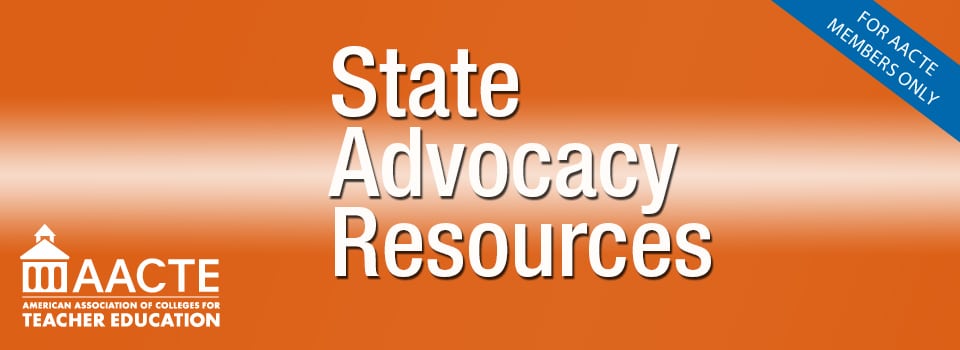
I am thrilled to announce that AACTE’s contact lists for state policy makers in each state and the District of Columbia have been updated and posted in the AACTE Resource Library (accessible to AACTE members only!). In addition, links to these lists can be found on the AACTE Advocacy Center’s State Advocacy page and on AACTE’s State Policy and Legislation page.
These documents are an AACTE member benefit to support you in your state-level advocacy work. Use them to find key state policy makers–for example, legislators for authorizing and appropriating education funds, state department of education contacts, and even your governor’s education staffer.
31 Jul2018
By Kristin McCabe

East Carolina University (ECU) has been named the new institutional home of the North Carolina New Teacher Support Program (NC NTSP), which provides university-based professional development and on-site instructional coaching for new teachers throughout the state.
The NC NTSP aims to boost the effectiveness and reduce attrition among early-career teachers in order to raise student achievement, especially in historically disadvantaged and underserved school districts.
Originally launched with federal Race to the Top grant funds in 2012, the program now operates with funding from the state legislature, which allows districts to enroll teachers in the program at a subsidized rate. Nine universities in the UNC System provide the instructional support in partnership with 53 school districts around the state.
24 Jul2018
By Deborah Koolbeck

Just a quick reminder to AACTE state chapters across the country: Friday, July 27, is the application deadline for the 2018-19 AACTE State Chapter Support Grants.
This year, a total of $40,000 is available for state chapter activities, and $10,000 is available to support chapter capacity and development, as described in the request for proposals.
22 Jun2018
By Kristin McCabe
Members of the Arkansas Association of Colleges for Teacher Education participate in a recent annual conference; at right, current chapter President Victoria Groves-Scott of the University of Central Arkansas addresses members.
The 47 state chapters of AACTE employ a wide variety of membership models, activity calendars, and strategic partnerships to meet the priorities of their members. While all chapters are based on the fundamental value of interinstitutional collaboration, these coalitions are not just about members talking to themselves or circling the wagons. They also provide an effective launching point for their individual and collective members to connect with external groups that lend important new perspectives and advantages.
The Arkansas Association of Colleges for Teacher Education (ArACTE) offers an example of how connections forged outside its membership boost its capacity to focus on advocacy priorities as a group–and on common programmatic concerns at the campus level.
21 May2018
By Kristin McCabe

A new website aims to equip state education agencies to support principals for better serving students with disabilities. AACTE is among nearly two dozen organizations convened by the Council of Chief State School Officers (CCSSO) to develop the site’s content.
The resulting online guide, Supporting Inclusive Schools for the Success of Each Child: A Guide for States on Principal Leadership, outlines eight strategies for states to embed expectations for inclusive principal leadership in policy and practice:
18 May2018
By Brian P. Yusko
The views expressed in this post do not necessarily reflect the views of AACTE.

In the face of continuing criticism of teacher preparation, the Ohio Association of Colleges for Teacher Education (OACTE) has worked to advocate for sensible teacher preparation policy. Although advocacy was not something many in OACTE envisioned would factor into their higher education careers, we have come to believe that advocacy is not only important, but essential, to the continued health and evolution of teacher education work.
27 Apr2018
By Zachary VanHouten
A new resource developed by the Education Commission of the States (ECS) offers a 50-state comparison of school leader certification and preparation programs, along with individual state profiles.
As more attention turns to the ways in which school leaders are prepared and certified, particularly in light of the impact school leaders have on student learning, states are evaluating and developing policies to strengthen and improve the quality of school leaders. ECS conducted the 50-state assessment of school leader policies and identified the following key takeaways:
24 Apr2018
By Deborah Koolbeck

AACTE is pleased to offer the State Chapter Support Grant Program for the 2018-2019 academic year, directing member dues toward supporting the development of AACTE state chapter initiatives and relationships. Applications for the grants are now being accepted through AACTE’s online submission site.
For the current funding cycle, the AACTE Board of Directors has allocated a total of $50,000 for the grant program, of which $40,000 is for “Chapter Activities” and $10,000 is for “Chapter Development.”
14 Feb2018
By Kristin McCabe
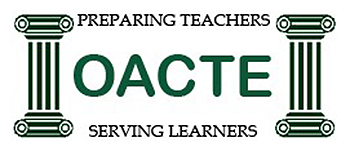
Last month, the Oregon Association of Colleges for Teacher Education (OACTE) convened the second annual Oregon Education Summit, organized to unite as many stakeholder groups as possible around educator preparation and related topics. Held January 5 at Western Oregon University in Monmouth, just 15 miles from the State Capitol in Salem, the gathering attracted representatives from every OACTE member institution as well as community colleges, legislators, PK-12 district staff, the state Department of Education and licensing agency, and nongovernmental agencies.

The summit was borne of the desire by OACTE to both claim a seat at the state table and access first-hand information – while establishing the organization and its members as willing collaborators on all aspects of education in the state. The first summit, held a year ago, was a success that organizers were eager to build on in Year 2. “Our first step is always a proactive one. We begin by asking, ‘How can we help?’” said OACTE President Leif Gustavson, who is dean of the College of Education at Pacific University. “Then we tend to get invited to the table. We are not an obstructionist organization, and we need to not think of others that way either. The summit gives us all an opportunity to meet face to face and realize the potential of what we can accomplish collectively.”
02 Jan2018
By Aaron Goldstein
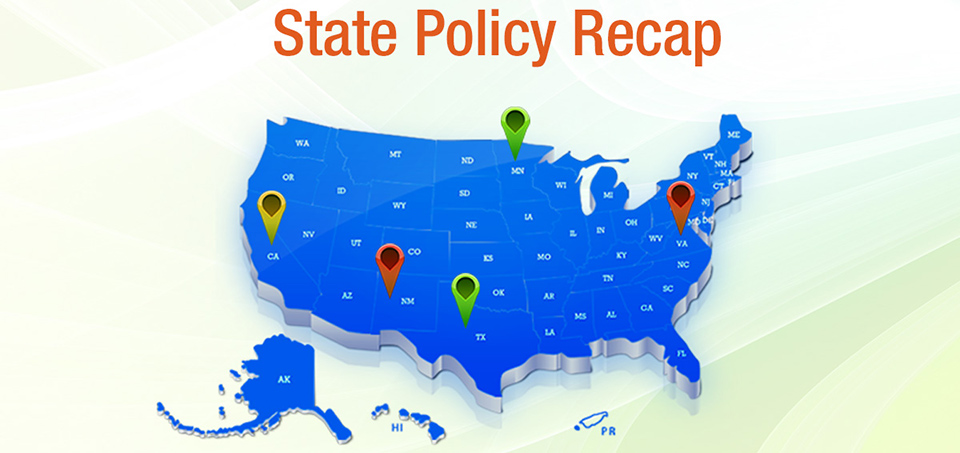
In 2017, state policy makers – particularly state legislators and state education agencies – placed great emphasis on key policy levers affecting educator preparation.
AACTE’s State Policy Tracker, an online tool that is available free of charge to AACTE members, allows for real-time tracking of pertinent state legislation and regulations affecting educator preparation. (If you are not familiar with the State Policy Tracker, I invite you to watch an archived webinar here.) During 2017, this tool enabled us to track 285 bills, of which 43 were enacted, and 296 regulations, of which 193 were adopted.
29 Sep2017
By Aaron Goldstein
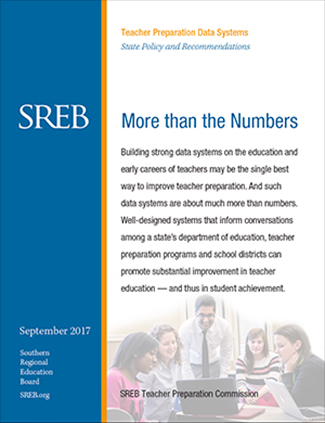
A commission made up of college of education deans, state legislators, university presidents, heads of postsecondary systems, state and district superintendents, and leaders of nationwide organizations has released a report presenting recommendations for state policy related to teacher preparation data systems. This Teacher Preparation Commission of the Southern Regional Education Board, a nonprofit organization that works with states to improve public education and support state policy makers, is charged with developing and identifying state recommendations to improve teacher preparation programs.
More Than the Numbers – Teacher Preparation Data Systems: State Policy and Recommendations, the Commission’s first report, focuses on how to build strong statewide data systems for teacher preparation drawing on policy models in three states – Louisiana, North Carolina, and Tennessee. In Louisiana, the report acknowledges the work of the Board of Regents and the Louisiana Teacher Preparation Program Dashboard for promoting data in a more accessible and transparent way. In North Carolina, the report praises the University of North Carolina Educator Quality Dashboard. In Tennessee, the State Board of Education, Tennessee Department of Education, and Tennessee Higher Education Commission redesigned the state’s Teacher Preparation Report Card to provide an interactive tool for aspiring teachers. Other practices that the report praises are data systems’ ability to follow teachers through their careers, focus on outcome measures, break down data “silos,” and make data more accessible.
19 Sep2017
By Aaron Goldstein
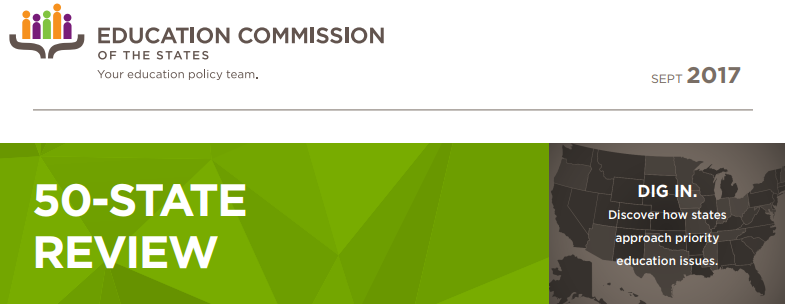
Today, the Education Commission of the States (ECS), a national organization of state education policy leaders, released a report that reviews state policies related to teacher license reciprocity. While states are facing educator pipeline challenges, the report finds that teacher licensure systems are intended to ensure educator quality, but have the potential of limiting cross-state mobility that could cause harm teacher attrition and retention.
The report explores teacher license reciprocity – in which a candidate who possesses an out-of-state license can earn a license in a new state based on state requirements. At the national level, the report references the National Association of State Directors of Teacher Education and Certification (NASDTEC) Interstate Agreement, which collects agreements between NASDTEC member states to understand which licenses are transferable and what additional requirements might be needed. At the state level, the report finds that since last year, 11 states have enacted new laws or regulations that facilitate teacher license reciprocity. Two states – Arizona and Nevada – became full reciprocity states by enacting new laws that remove barriers for licensure. Two additional states – Oklahoma and Delaware – passed new laws that waive certain assessment requirements for out-of-state candidates.
14 Sep2017
By Aaron Goldstein

This week, the Council of Chief State School Officers (CCSSO) released Transforming Educator Preparation: Lessons Learned From Leading States, a playbook for how states can improve educator preparation based on the experience of the Network for Transforming Educator Preparation (NTEP).
States that participated in NTEP – a multiyear effort to identify policies that effectively support the preparation of profession-ready teachers – were California, Connecticut, Delaware, Georgia, Idaho, Kentucky, Louisiana, Massachusetts, Missouri, New Hampshire, Oklahoma, South Carolina, Tennessee, Utah, and Washington.
11 Sep2017
By Aaron Goldstein
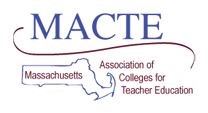 Last month, AACTE staff hosted an exhibit at the National Conference of State Legislators (NCSL) Legislative Summit in Boston, Massachusetts. We also invited leaders of the local AACTE state chapter, the Massachusetts Association of Colleges for Teacher Education (MACTE), to join us in the exhibit booth to share their work with attendees. Over 5,000 state legislators, state legislative staff, and trade association representatives attended the conference.
Last month, AACTE staff hosted an exhibit at the National Conference of State Legislators (NCSL) Legislative Summit in Boston, Massachusetts. We also invited leaders of the local AACTE state chapter, the Massachusetts Association of Colleges for Teacher Education (MACTE), to join us in the exhibit booth to share their work with attendees. Over 5,000 state legislators, state legislative staff, and trade association representatives attended the conference.
As I learned from last year’s NCSL Legislative Summit (see my takeaways here), state legislators are eager to receive input from teacher educators. One recurring theme from my conversations with state legislators this year was that they are unfamiliar with the major state policy levers pertaining to educator preparation – accreditation, licensure, and program approval. It was good for AACTE staff and MACTE leaders to interact with attendees from dozens of states, including many members of state legislatures’ education committees.
30 Aug2017
By Aaron Goldstein

Seven state chapters of AACTE will share $50,000 in funding from the 2017 State Chapter Support Grant competition.
AACTE is pleased to support these state chapters as they develop new initiatives and projects focused on advocacy, program quality, and chapter development. For the 6th year, these grants will help strengthen AACTE’s relationship with our state chapters.



















 Last month, AACTE staff hosted an exhibit at the
Last month, AACTE staff hosted an exhibit at the